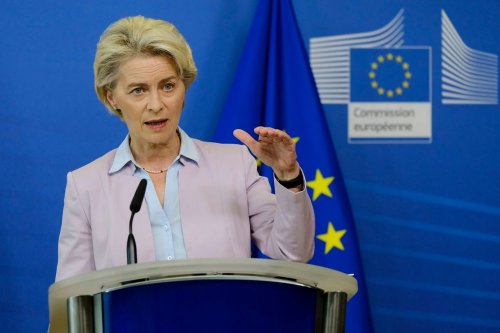During the post-war reconstruction of Ukraine, climate modernization should be the central idea of economic transformation, and reconstruction should include the positive experience of environmental policies of post-war reconstruction of advanced countries.
This was announced by the coordinator of the Committee on Industrial Ecology and Sustainable Development of the European Business Association Olga Boyko, reports Economic truth.
All new industrial facilities in metallurgy, food processing and energy will be based on the principles of the "green economy", namely the minimization of carbon footprint and dependence on fossil fuels, due to significant financial resources of Western partners.
The concept of economic recovery, voiced in the Office of the President and the Government, also includes Ukraine's accession to the EU in 2024, energy independence and deregulation of doing business.
The European Union has already announced its intention to support Ukrainians in post-war reconstruction. To this end, the European Council will establish the Solidarity Trust Fund of Ukraine. In addition, the United States, Great Britain, Sweden, Spain and other countries have already expressed their readiness to financially support the country's reconstruction.
"The member companies of the European Business Association share such views of the authorities and, in turn, offer to look at the experience of post-war reconstruction of some of the most developed countries in the context of environmental policy development," said Boyko.
Japanese economic miracle
After the end of World War II, Japan's main goal was to rebuild its economy, primarily to create an industrial base and develop infrastructure. In the mid-1950s, thanks to the cooperation of government and industry, as well as the mastery of technology, Japan quickly rose to the rank of the world's largest economies.
During the first ten years after the end of the war, the issues of mining, standardization and labeling of agricultural products and wood, use of chemicals and fertilizers in agriculture, protection of plants, natural areas, wildlife, fish resources, etc. were regulated by law.
In Tokyo, the first industrial pollution ordinance was passed in 1949, requiring factories to obtain permits from city officials and provide information on emissions, but did not implement any specific standards.
A separate phenomenon that covered the whole country at that time was the fight against pollution outbreaks by concluding agreements between local authorities and business (Pollution Control Agreement). In the period from 1952-1970 there was an agreement on pollution control concluded between 106 local authorities and 496 companies. Working groups were set up under the agreements, which also included locals to control pollution.
The greatest effectiveness of environmental policy was observed in 1960-1970, thanks to the joint funding of environmental measures by the private sector and the state.
Israel
Since 1948 and during the first decades of independence, the Israeli government has focused on the economic development of the country, where the population has grown fivefold in twenty years and GDP has grown by 11% annually, making it the largest relative increase in the world.
During the first year of the state of Israel, a moratorium on hunting was introduced to return lands to sustainable development and a number of laws were passed to protect wildlife, create national parks and reserves, ban smoking in protected forests, and more.
Israel's environmental problem at the time was landfills that did not meet sanitary standards, pollution of water bodies with wastewater, air from industry and cars, lack of control over the use of pesticides by the state, and so on.
60-70% of the wet waste fraction was the remains of vegetables and fruits. As early as 1953, the first fully mechanized composting complex with sorting lines in the country appeared in Tel Aviv, thanks to the cooperation of government and business. Since then, a third of municipal waste has been processed into compost.
Dorr-Oliver has received a $ 0.75 cent subsidy from the Tel Aviv government for its $ 1.2 million recycling facility, due to significant landfill savings. It also sold black humus for $ 5 per m3.
Thanks to similar projects, in 1960 40% of composting waste was converted into organic fertilizers, which were used , mainly for growing citrus.
The first law on the reduction of harmful emissions, which prohibited unjustified air pollution, noise and odors, was passed only in 1961. It was not until 1973 that Israel was able to launch a full-fledged natural resource management program based on a combination of economic development.
West Germany
After the end of World War II, Germany plunged into rebuilding its economy, bombing cities and integrating millions of displaced people into new life. By 1958, West German industrial production was four times higher than a decade ago.
During the first postwar decade, West Germany regulated the protection of forests and plants, the agricultural and mining sectors, hunting, and land issues.
In 1952, the head of the Ruhr Territorial Association for Regional Planning presented a detailed plan to set up an air pollution cooperative in North Rhine-Westphalia, where businesses, local municipalities and regional planners were to come together and develop technical guidelines for air purification and air purification measures. But the relevant legislation was passed only in the early 1970s.
Conclusions for Ukraine
In the post-war period, the countries worked to recover quickly, and environmental policies focused primarily on the protection and further restoration of natural resources of national and international importance.
"Ukraine, with available resources, technologies and cooperation with the state in business to deregulate and alleviate the tax burden, has a unique chance not only to become an economic miracle of the 21st century, a European tiger, but also a model in terms of sustainable development." said Boyko.
We will remind, aggression of the Russian Federation endangered Ukraine's decarbonisation plans.
As EcoPoliticа reported earlier, to the EU Mission on climate-neutral and smart cities 100 participants joined.





